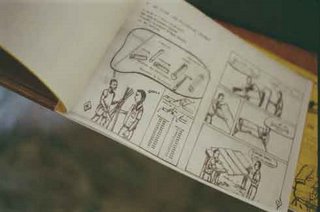
On the Ground
There's nothing good in saying so, but I'm finding opening Blogger rather frightening lately. There are so many great African blogs, that my mind really buzzes with ideas and information I get. And same as it ever was the more one learns the more we learn how little we know.
Emeka Okafor's Timbuktu Chronicles is a wonderful blog which highlights African solutions to African challenges. I'm also so fascinated by the structure of his posts. They are short but amply hyper-linked, and many of his links refer to his previous posts. I wonder how he manages to remember all of them? Anyway, while his posts give the gist they also provide lots of great reading in more depth if you follow the links.
His February 22, 2006 post, Souleymane Sarr revisited had a passage that actually brought tears to my eyes. I'll quote it with the hyper-links so you can see what I mean about that aspect of his posts too:
Souleymane's new approach to training artisans involves pairing unemployed university graduates, "who think they know everything," as Souleymane says, with unemployed street youth, "who think they know nothing". The result is teams of young people capable of launching their own micro-enterprises.Okafor is quoting that but I'm not sure from which of his 13 links, sorry. I would encourage you to go to his post and click every single one for yourself. And if you have to choose only one, choose this one at Oxfam America which features the Association Jeunesse Actions--Mali that Souleymane Sarr founded. The photo credit is Nick Rabinowitz and is from the site.
The photo shows the use of comic books to teach essential skills. It's just one small part of the genius of Souleymane Sarr's program, but it really caught my attention because my mind's eye view of my idea of Cracker Jack Books, small books folded from one-third sheet of paper, was something like the page in the photo. The essential point is that a wealth of information can be conveyed visually with few words in a small space.
A friend has suggested the name, Microlibros instead of Cracker Jack Books and I think that's better. The idea of tiny booklets made from a third of a sheet of paper was simply to imagine the cheapest book possible that could be printed with regular computer printers. Clearly there are plenty of other formats for small books as the thriving Zine culture demonstrates. Keguro owner of the most eloquent and evocative Gukira (He's on a brief hiatus to attend to looming deadlines) left a comment to a recent post:
I'm planning, should I get time, support, and money (always comes down to money), to enact one of the many ideas I've floated: a chap-book operation. Short texts (16-30 pages), sold very cheaply (it's not about profit) to support emerging writers and nurture a reading culture.I missed the post where he floated that idea, but nearly fell off my chair when I read that because I think it such a splendid one!
There was a report about Cowboy Poets on the PBS Newshour last night. An academic interviewed mentioned that there was a great tradition of reading among cowboys. Apparently there were coupons in tobacco pouches they could collect and send in to receive small books; like abridged Shakespearean plays and poetry. I was thrilled because the coupons seem a little like Bazungu Bucks and it's those little books I love.
Erik Hersman, a.k.a., White African put up a great idea on the blog on Monday, A Web Technology Idea for Africa. He used the opportunity to test out his new Apple iWork software and produce a very professional PDF brochureto lay it out. What White African proposes is to use cell phones as a common portal to the Internet in Africa.
It's an exciting idea. Something that makes it particularly so is that he's blogging about it, in other words seeking input and opinions from readers. In the comments left was a point about the importance of local languages and local networks, so in today's post Technology vs Tribal Languages in Africa he fleshes that topic out a bit. The prospects of open-source projects like this are a great way that many can help create something good.
Afromusing floated a tree planting idea late last month, A dollar a tree? and is soliciting comments. Kiva and Fully Belly Blog are two more examples of using blogs to make a real difference. With this many-to-many medium even our comments can contribute on the ground.
1 comment:
I agree with you: it scares me the amount of stuff that I do not know that I pick up on African blogs. I am afraid to get online sometimes too since all I do is consume consume consume while I really need to spend some time producing.
Post a Comment